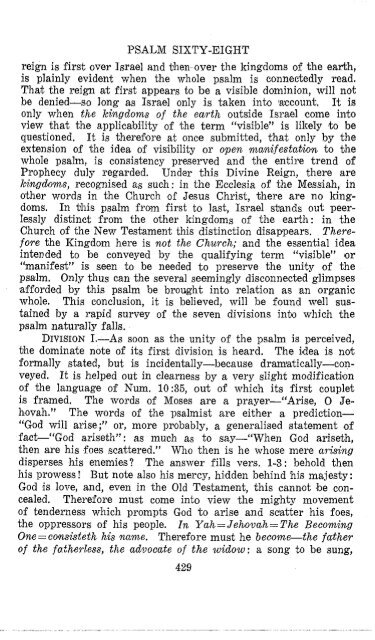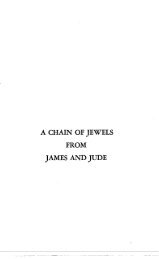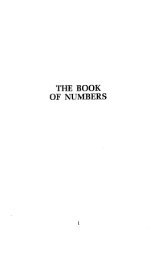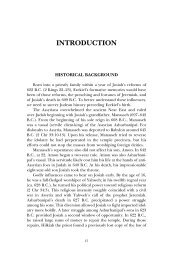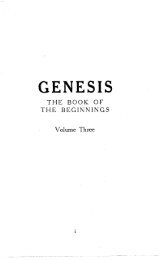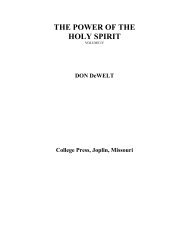- Page 1 and 2:
STUDIES IN THE PSALMS i
- Page 3 and 4:
BIBLE STUDY TEXTBOOK SERIES STUDIES
- Page 5 and 6:
CONTENTS Foreword ............. ...
- Page 7:
CONTENTS Psalm Forty-four .........
- Page 10 and 11:
’ STUDIES IN PSALMS my mind and s
- Page 12 and 13:
PREFACE The aim of this volume is t
- Page 14 and 15:
STUDIES IN PSALMS To Dr. Ginsburg m
- Page 16 and 17:
STUDIES IN PSALMS 8
- Page 18 and 19:
STUDIES IN PSALMS towards the close
- Page 20 and 21:
STUDIES IN PSALMS D. COPYISTS, or p
- Page 22 and 23:
STUDIES IN PSALMS is clear, then, t
- Page 24 and 25:
STUDIES “IN PSALMS result, he gai
- Page 26 and 27:
STUDIES IN PSALMS Thirdly, as with
- Page 28 and 29:
STUDIES IN PSALMS 4 As to allegory:
- Page 30 and 31:
STUDIES IN PSALMS Mere repetition R
- Page 32 and 33:
STUDIES IN PSALMS playing in the Ea
- Page 34 and 35:
STUDIES IN PSALMS reel, a wild pass
- Page 36 and 37:
STUDIES IN PSALMS It is just at thi
- Page 38 and 39:
STUDIES IN PSALMS (f) The revised r
- Page 40 and 41:
STUDIES IN PSALMS is Concealed, thi
- Page 42 and 43:
STUDIES IN PSALMS tion or as a repr
- Page 44 and 45:
STUDIES IN PSALMS the Preface to th
- Page 46 and 47:
STUDIES IN PSALMS length of a down
- Page 48 and 49:
STUDIES IN PSALMS the abiding offic
- Page 50 and 51:
STUDIES IN PSALMS places may be oon
- Page 52 and 53:
STUDIES IN PSALMS It is not meant t
- Page 54 and 55:
STUDIES IN PSALMS Not otherwise can
- Page 56 and 57:
23. 24. 25. 26. 27. 28. 29. 30. 31.
- Page 58 and 59:
75, 76. 77. 78. 79. 80. 81 I 82. 83
- Page 60 and 61:
STUDIES IN PSALMS 127. In Relief of
- Page 62 and 63:
Aram. : Aramean. A.V. : Authorized
- Page 64 and 65:
STUDIES IN PSALMS 56
- Page 66 and 67:
STUDIES IN PSALMS But rather in the
- Page 68 and 69:
STUDIES IN PSALMS discover his song
- Page 70 and 71:
STUDIES IN PSALMS 6. What is involv
- Page 72 and 73:
STUDIES IN PSALMS 2 For a summit co
- Page 74 and 75:
STUDIES IN PSALMS scendants, to who
- Page 76 and 77:
STUDIES IN PSALMS w,ill be amply fu
- Page 78 and 79:
STUDIES IN PSALMS and “cords” f
- Page 80 and 81:
STUDIES IN- PSALMS ings of enemies
- Page 82 and 83:
STUDIES IN PSALMS PSALM 3 DESCRIPTI
- Page 84 and 85:
STUDIES IN PSALMS ver. 7; but then
- Page 86 and 87:
STUDIES IN PSALMS anointed? Hadn’
- Page 88 and 89:
STUDIES IN PSALMS 4 Stand before th
- Page 90 and 91:
STUDIES IN PSALMS \ be more becomin
- Page 92 and 93:
3 4 5 6 7 8 9 STUDIES IN PSALMS Jeh
- Page 94 and 95:
STUDIES IN PSALMS It is perfectly c
- Page 96 and 97:
8 9 10 STUDIES IN PSALMS Depart fro
- Page 98 and 99:
STUDIES IN PSALMS From this point o
- Page 100 and 101:
5. 6. 7. 8. 9. 10. STUDIES IN PSALM
- Page 102 and 103:
STUDIES IN PSALMS PARAPHRASE PSALM
- Page 104 and 105:
STUDIES IN PSALMS his human creatur
- Page 106 and 107:
STUDIES IN PSALMS moved up from the
- Page 108 and 109:
STUDIES IN PSALMS 4 I cannot unders
- Page 110 and 111:
STUDIES IN PSALMS appear from an ex
- Page 112 and 113:
STUDIES IN PSALMS of his foes. That
- Page 114 and 115:
1. 2. 3. 4. 5. 6. STUDIES IN PSALMS
- Page 116 and 117:
STUDIES IN PSALMS 16 Jehovah hath m
- Page 118 and 119:
STUDIES IN %PSALMS 4 The lawless on
- Page 120 and 121:
STUDIES IN PSALMS 13 Why do You let
- Page 122 and 123:
STUDIES IN PSALMS we choose rather
- Page 124 and 125:
STUDIES IN PSALMS PSALM 1 1 DESCRIP
- Page 126 and 127:
STUDIES IN PSALMS -counsels which t
- Page 128 and 129:
STUDIES IN PSALMS 7 Thou Jehovah wi
- Page 130 and 131:
STUDIES IN PSALMS almost verbally r
- Page 132 and 133:
STUDIES IN PSALMS 2 haw long must I
- Page 134 and 135:
STUDIES IN PSALMS lit up with joyPu
- Page 136 and 137:
STUDIES IN PSALMS PARAPHRASE PSALM
- Page 138 and 139:
STUDIES IN PSALMS The sad fact that
- Page 140 and 141:
STUDIES IN PSALMS Nor, again, have
- Page 142 and 143:
STUDIES IN PSALMS PSALM 15 DESCRIPT
- Page 144 and 145:
STUDIES IN PSALMS QUESTIONS FOR DIS
- Page 146 and 147:
STUDIES IN PSALMS 11 For thou wilt
- Page 148 and 149:
STUDIES IN PSALMS It is, however, w
- Page 150 and 151:
STUDIES IN PSALMS already noted; an
- Page 152 and 153:
STUDIES IN PSALMS ‘2: Please read
- Page 154 and 155:
STUDIES IN PSALMS ’* 24 Publicly
- Page 156 and 157:
STUDIES IN PSALMS circumstances, wo
- Page 158 and 159:
4 5 6 7 8 9 10 11 12 13 14 15 16 ST
- Page 160 and 161:
34 35 36 37 38 39 40 41 42 43 44 45
- Page 162 and 163:
STUDIES IN PSALMS 13 The Lord thund
- Page 164 and 165:
STUDIES IN PSALMS pate the Canaanit
- Page 166 and 167:
STUDIES IN PSALMS conscious of a Di
- Page 168 and 169:
. STUDIES IN PSALMS love (h-sh-k) u
- Page 170 and 171:
3 4 5 6 7 8 9 10 11 12 STUDIES IN P
- Page 172 and 173:
STUDIES IN PSALMS 14 May my spoken
- Page 174 and 175:
STUDIES IN PSALMS to the glory of G
- Page 176 and 177:
STUDIES IN PSALMS But if nouns and
- Page 178 and 179:
STUDIES IN PSALMS sins, if not ster
- Page 180 and 181:
6. 7. 8. 9. 10. STUDIES IN PSALMS I
- Page 182 and 183:
STUDIEj3 IN PSALMS EXPQSITIQN This
- Page 184 and 185:
STUDIES IN PSALMS PSALM 21 DESCRIPT
- Page 186 and 187:
STUDIES IN PSALMS 12 They will turn
- Page 188 and 189:
STUDIES IN PSALMS PART 1.-Stanza I,
- Page 190 and 191:
21 22 23 24 25 STUDIES IN PSALMS Sa
- Page 192 and 193:
STUDIES IN PSALMS 16 The enemy, thi
- Page 194 and 195:
STUDIES IN PSALMS distress of all b
- Page 196 and 197:
STUDIES IN PSALMS is no prima-facie
- Page 198 and 199:
STUDIES ’IN PSALMS we render vigo
- Page 200 and 201:
STUDIES IN PSALMS my soul he refres
- Page 202 and 203:
STUDIES IN PSAL I hear his voice, a
- Page 204 and 205:
STUDIES IN PSALMS PARAPHRASE PSALM
- Page 206 and 207:
STUDIES IN PSALMS to belong to the
- Page 208 and 209:
STUDIES *IN PSALMS for use. The who
- Page 210 and 211:
16 16 17 18 19 20 21 22 STUDIES IN
- Page 212 and 213:
. STUDIES IN PSALMS The refrains to
- Page 214 and 215:
STUDIES IN PSALMS ’ 11 Sitnce I i
- Page 216 and 217:
STUDIES IN PSALMS (Lm.) -By David.
- Page 218 and 219:
STUDIES IN PSALMS 7 Listen to my pl
- Page 220 and 221:
1. 2. 3. 4. 5. STUDIES IN PSALMS QU
- Page 222 and 223:
STUDIES IN PSALMS 4 Give them the p
- Page 224 and 225:
STUDIES IN PSALMS are contrary to t
- Page 226 and 227:
STUDIES IN PSALMS 2 Praise Him for
- Page 228 and 229:
2 3 4 5 6 7 8 9 10 11 12 STUDIES IN
- Page 230 and 231:
STUDIES IN PSALMS regarded as a ple
- Page 232 and 233:
2 3 4 5 6 7 8 9 10 11 STUDIES IN PS
- Page 234 and 235:
STUDIES IN PSALMS it is the faithfu
- Page 236 and 237:
STUDIES IN PSALMS and 8 admirably s
- Page 238 and 239:
STUDIES IN PSALMS 5. “I spoke too
- Page 240 and 241:
6 7 8 9 10 11 12 13 14 16 16 17 18
- Page 242 and 243:
6 STUDIES IN PSALMS 3 Compose new s
- Page 244 and 245:
STUDIES IN PSALMS confessed sin can
- Page 246 and 247:
STUDIES IN PSALMS PSALM 34 DESCRIPT
- Page 248 and 249:
STUDIES IN PSALMS 4 For I cried to
- Page 250 and 251:
STUDIES IN PSALMS been due as much
- Page 252 and 253:
PSALM 35 DESCRIPTIVE TITLE Prayers
- Page 254 and 255:
21 22 23 24 25 26 27 28 STUDIES IN
- Page 256 and 257:
STUDIES IN PSALMS 24 Declare me “
- Page 258 and 259:
STUDIES IN PSALMS for example, be d
- Page 260 and 261:
7 8 9 10 11 12 STUDIES IN PSALMS Ho
- Page 262 and 263:
STUDIES IN PSALMS active? We can co
- Page 264 and 265:
9 10 11 12 13 14 15 16 17 18 19 20
- Page 266 and 267:
STUDIES IN PSALMS 40 And Jehovah wi
- Page 268 and 269:
STUDIES IN PSALMS man-the blameless
- Page 270 and 271:
STUDIES IN PSALMS more light to bre
- Page 272 and 273:
12 13 14 15 16 17 18 19 20 21 22 ST
- Page 274 and 275:
STUDIES IN PSALMS writer acknowledg
- Page 276 and 277:
STUDIES IN PSALMS PSALM 39 DESCRIPT
- Page 278 and 279:
STUDIES IN PSALMS 10 Lord, don't hi
- Page 280 and 281:
STUDIES IN PSALMS forming the high-
- Page 282 and 283:
3 4 6 6 7 8 9 10 STUDIES IN PSALMS
- Page 284 and 285:
STUDIES IN PSALMS me, and stand in
- Page 286 and 287:
STUDIES IN PSALMS example of loving
- Page 288 and 289:
STUDIES IN PSALMS Gxclaim, to the i
- Page 290 and 291:
6 7 8 9 10 11 12 13 STUDIES IN PSAL
- Page 292 and 293:
STUDIES IN PSALMS of the keynote ap
- Page 294 and 295:
STUDIES IN PSALMS whom we know, and
- Page 296 and 297:
4 5 6 7 8 9 10 11 STUDIES IN PSALMS
- Page 298 and 299:
STUDIES IN PSALMS 2 For thou art my
- Page 300 and 301:
STUDIES IN PSALMS reasons, count fo
- Page 302 and 303:
STUDIES IN PSALMS rock: the waters
- Page 304 and 305:
STUDIES IN PSALMS PSALM 44 DESCRIPT
- Page 306 and 307:
STUDIES IN PSALMS our body’ hath
- Page 308 and 309:
STUDIES IN PSALMS we may justly ref
- Page 310 and 311:
STUDIES IN PSALMS temporary despair
- Page 312 and 313:
4 5 6 7 8 9 10 11 12 13 14 15 STUDI
- Page 314 and 315:
STUDIES IN PSALMS 8 Your robes are
- Page 316 and 317:
STUDIES IN PSALMS from whose pen co
- Page 318 and 319:
STUDIES IN PSALMS teach him what to
- Page 320 and 321:
STUDIES IN PSALMS outlook of the ps
- Page 322 and 323:
STUDIES IN PSALMS spirimtual commun
- Page 324 and 325:
STUDIES IN PSALMS PSALM 46 DESCRIPT
- Page 326 and 327:
STUDIES IN PSALMS EXPOSITION The th
- Page 328 and 329:
STUDIES IN PSALMS and 7, 8, God’s
- Page 330 and 331:
STUDIES IN PSALMS Latin, in support
- Page 332 and 333:
1. 2. 3. 4. 5. STUDIES IN PSALMS QU
- Page 334 and 335:
STUDIES IN PSALMS PARAPHRASE PSALM
- Page 336 and 337:
STUDIES IN PSALMS The time being no
- Page 338 and 339:
5 6 7 8 9 10 11 12 13 14 16 16 17 S
- Page 340 and 341:
STUDIES IN PSALMS 15 But as for me,
- Page 342 and 343:
STUDIES IN PSALMS little grave-how
- Page 344 and 345:
STUDIES IN PSALMS PSALM 50 DESCRIPT
- Page 346 and 347:
STUDIES IN PSALMS 22’ I Will conv
- Page 348 and 349:
STUDIES IN PSALMS signed to remind
- Page 350 and 351:
STUDIES IN PSALMS afih “for the r
- Page 352 and 353:
STUDIES IN PSALMS (Lm.) Psalm-By Da
- Page 354 and 355:
STUDIES IN PSALMS ; 6 You deserve h
- Page 356 and 357:
STUDIES IN PSALMS need so deep must
- Page 358 and 359:
STUDIES IN PSALNS conscience of a n
- Page 360 and 361:
STUDIES IN PSALMS One thought more.
- Page 362 and 363:
STUDIES IN PSALMS I will proclaim1
- Page 364 and 365:
STUDIES IN PSALMS PSALM 53, 54 PSAL
- Page 366 and 367:
STUDIES IN PSALMS 2 0 God hear thou
- Page 368 and 369:
STUDIES IN PSALMS the expense of th
- Page 370 and 371:
18 19 12 13 14 20 21 9 10 11 15 STU
- Page 372 and 373:
STUDIES IN PSALMS 14 What fellowshi
- Page 374 and 375:
STUDIES IN PSALMS psychological pro
- Page 376 and 377:
STUDIES IN PSALMS hope of leaving a
- Page 378 and 379:
STUDIES IN PSALMS Ei All the day my
- Page 380 and 381:
STUDIES IN PSALMS and to wreak on h
- Page 382 and 383:
STUDIES IN PSALMS “‘ They digge
- Page 384 and 385:
STUDIES IN PSALMS With respect to t
- Page 386 and 387: STUDIES IN PSALM@ 11 A son of earth
- Page 388 and 389: STUDIES IN PSALMIS their terrible i
- Page 390 and 391: 10 11 12 13 14 15 16 17 STUDIES IN
- Page 392 and 393: STUDIES IN PSALMS David’s fellow-
- Page 394 and 395: STUDIES IN PSALMS 2. Consider caref
- Page 396 and 397: STUDIES IN PSALMS 0 God, You have r
- Page 398 and 399: 1. 2. 3. 4. 5. STUDIES IN PSALMS QU
- Page 400 and 401: STUDIES IN PSALMS to return to Jeru
- Page 402 and 403: 6 7 8 9 10 11 12 STUDIES IN PSALMS
- Page 404 and 405: STUDIES IN PSALM6 is confidence car
- Page 406 and 407: STUDIES IN PSALMS ANALYSIS Stanza I
- Page 408 and 409: STUDIES IN PSALMS have lamented his
- Page 410 and 411: STUDIES IN PSALMIS PSALM 64 DESCRIP
- Page 412 and 413: STUDIES IN PSALMS and offered the m
- Page 414 and 415: STUDIES IN PSALMS 4 ‘ (Lm. ) Psal
- Page 416 and 417: STUDIES IN PSALMS 13 The pastures a
- Page 418 and 419: STUDIES IN PSALMS with the nations
- Page 420 and 421: PSALM 66 DESCRIPTIVE TITLE Invitati
- Page 422 and 423: e STUDIES IN PSALMS PARAPHRASE PSAL
- Page 424 and 425: STUDIES IN PSALMS trace the changef
- Page 426 and 427: STUDIES IN PSALMS instinctively fee
- Page 428 and 429: STUDIES IN PSALMS God our own God1
- Page 430 and 431: STUDIES IN PSALMS treatment of thei
- Page 432 and 433: 12 13 14 15 16 17 18 19 STUDIES IN
- Page 434 and 435: STUDIES IN PSALMS 31 There come hig
- Page 438 and 439: STUDIES IN PSALMS only with ‘deep
- Page 440 and 441: STUDIES IN PSALMS Thou didst ascend
- Page 442 and 443: STUDIES IN PSALMS already been give
- Page 444 and 445: STUDIES IN PSALMS In view of other
- Page 446 and 447: STUDIES IN PSALMS observe that by t
- Page 448 and 449: STUDIES IN PSALMS of God are promin
- Page 450 and 451: STUDIES IN PSALMS PSALM 69 DESCRIPT
- Page 452 and 453: 17 18 19 20 21 22 23 24 25 26 27 28
- Page 454 and 455: STUl31ES IN PSALMS 11 How they talk
- Page 456 and 457: STUDIES IN PSALMS Neatly connected
- Page 458 and 459: STUDIES IN PSALMS to athe righteous
- Page 460 and 461: STUDIES IN PSALMS The QUOTATIONS ma
- Page 462 and 463: STUDIES IN PSALMS 3 Let them turn b
- Page 464 and 465: STUDIES IN PSALMS yea out of the de
- Page 466 and 467: STUDIES IN PSALMS 1 EXPOSITION Alth
- Page 468 and 469: STUDIE8 IN PSALMS and deep pathos.
- Page 470 and 471: STUDIES IN PSALMS Psalm 71 1. This
- Page 472 and 473: 16 17 18 19 20 STUDIES IN PSALMS so
- Page 474 and 475: STUDIES IN PSALMS in a prayer to be
- Page 476: STUDIES IN PSALMS the pale-faced ci


